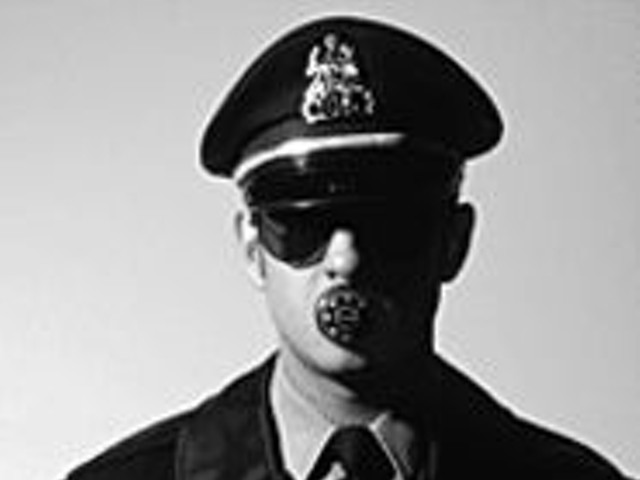"A friend of mine is a very religious person," says freshman Lindsey Chesky, a double major in biology and art. "She told me what her screen name was because I wanted to burn a CD from her. It turns out she had the most porn I've ever seen!"
Last year Wash. U. computer czars reduced each student's available external peer-to-peer bandwidth. The result was drastically increased download times from file-sharing programs like Kazaa and LimeWire. The university took action, says Matt Arthur, the school's director of residential technology services, because rampant downloading was slowing network functions of more legitimate educational value, such as e-mail. Muscle-flexing from groups such as the Recording Industry Association of America (RIAA) and Sony didn't help, either. "The two issues," says Arthur, "are the bandwidth issue and the copyright issue."
To fill the void, some daring student or students set up a their own computer as a server for DC++ ("DC" is short for "Direct Connect"), a program that allows files to be transferred within an internal network. (Though it's likely that more than one network administrator has been involved, for the purposes of this story we will treat the administrator as one person, whom we shall call "Hal.") The program functions much like the popular Kazaa but has distinct advantages over its better-known counterpart. Namely, it's not bogged down with pop-up ads, and users can download files from it about ten times faster. (Only Wash. U. students and faculty can access the network, which has the address washu.servebeer.com.)
Of course, downloading with DC++ is just as illegal as downloading with Kazaa. But that doesn't stop students, some of whom have been doing it for a couple of years now. DC++ is currently more popular than ever, and some estimate that half of the student body is on the network.
"Everyone on our floor uses it," says Chesky, who estimates that she uses the program about three times a week. "Some people go on it every hour on the hour."
One reason is the plethora of content. Although file sharers are drawing from a potential pool of only about 10,000 students, they have no problem downloading first-run movies, including Kill Bill: Vol. 1 and The Matrix Revolutions, long before they're released on video. "You can get episodes of The OC the day before they come out," Chesky adds, referring to the popular series on the Fox network.
Where do these pirated products come from? No one seems quite sure, although some speculate that students in the film department who receive advance copies of movies and TV shows might be responsible. Other possible culprits are among the university's large crop of foreign students, who go home to countries where copyright controls are less stringent than those in the United States.
In the Wild West of music piracy, Washington University officials don't want to play sheriff. They'd rather be the one-room schoolhouse's headmistress. Arthur says Wash. U.'s policy toward file-sharing is to educate rather than to punish.
"Part of this whole process is education," he says. "Much like our alcohol policy, we want our students to be aware of what they're doing, that what they're doing is considered illegal and that if they're caught, there have been cases of students around the country being sued."
This is in contrast to hard-line stances taken by other area universities. According to a Saint Louis University computer technician who asked to go unnamed, illegal file-sharing by students is "strictly forbidden." He says the school sends out strongly worded e-mails discouraging students from engaging in it. The University of Missouri-St. Louis, meanwhile, attempts to stop file-sharing not by reducing bandwidth but by blocking ports to popular file-sharing programs.
Wash. U.'s Arthur finds that type of action problematic.
"Everybody's university is their own situation," he explains. "We're all striving to do two things: one, comply with our legal obligations, and two, manage our bandwidth so that all of our constituents have full access to what they came to the university for. Which includes a wide variety of things. There are many ways to do research. Peer-to-peer software is, in and of itself, not illegal."
That said, Washington University is occasionally contacted by the RIAA and the Motion Picture Association of America with complaints that students are illegally downloading. When that happens, the school takes action.
"If it's not a repeated offense, we contact the user and let them know we have a complaint," says Arthur. "We tell them that deleting the file is a requirement, and we give them a period of time to respond. If we have repeat offenders, we send them to the student judicial process. That being said, I've never had a repeat offender.
"We've seen almost a 90 percent decrease from last year to this year on the number of complaints," he adds. "What that says is that our students are becoming more educated and have an understanding of the law."
It's either that or the fact that DC++ and the internal server largely fly under the RIAA's radar. "What the people who enforce those things do, I think, is use the same basic software everyone else does. They'll get Kazaa and do a search for their song or their movie," explains Arthur. Essentially, DC++ is harder to monitor because the RIAA doesn't have access to the WU server.
The RIAA refused to comment directly for this story but did submit a prepared statement:
"We have filed lawsuits against operators on college campuses across the country running [Kazaa]-like internal campus networks. This especially flagrant way of illegally distributing millions of copyrighted works over the Internet does not go unnoticed. These individuals are facilitating the massive theft of copyrighted music which affects everyone who brings music to the public. We believe it is important to enforce our rights against all types of copyright infringement."
They have done so before. Four university students from four different universities were sued by the RIAA last year for running DC++-type internal file-sharing programs. They eventually settled, each student agreeing to pay at least $12,000 and shut down the operation.
Meanwhile, the identity of "Hal" remains a mystery to most WU DC++ users. "I have no idea who's running it this year," says Matt Arnold, a sophomore economics major and an active file sharer, adding that Hal's identity changes frequently. "They try to keep it quiet because they don't like it when people IM or e-mail them and ask them questions."
Just because Hal doesn't reveal himself doesn't mean he's quiet. Last semester, users recall, he announced on the program's "welcome" message that the most commonly swapped files are porn.
And sometimes Hal gets testy. One rule for swapping is that everyone has to offer a certain number of files to share with others. Sometimes students don't have enough music or movies to meet the quota. So they'll offer up what is, in Hal's estimation, junk.
"A lot of people put their logged IM files on, and one time the administrator posted a couple's conversation about photographing themselves having sex," Arnold reports.
"People do stupid things on there," he notes. But for the most part, he says, "People are smart enough to protect their own privacy."






